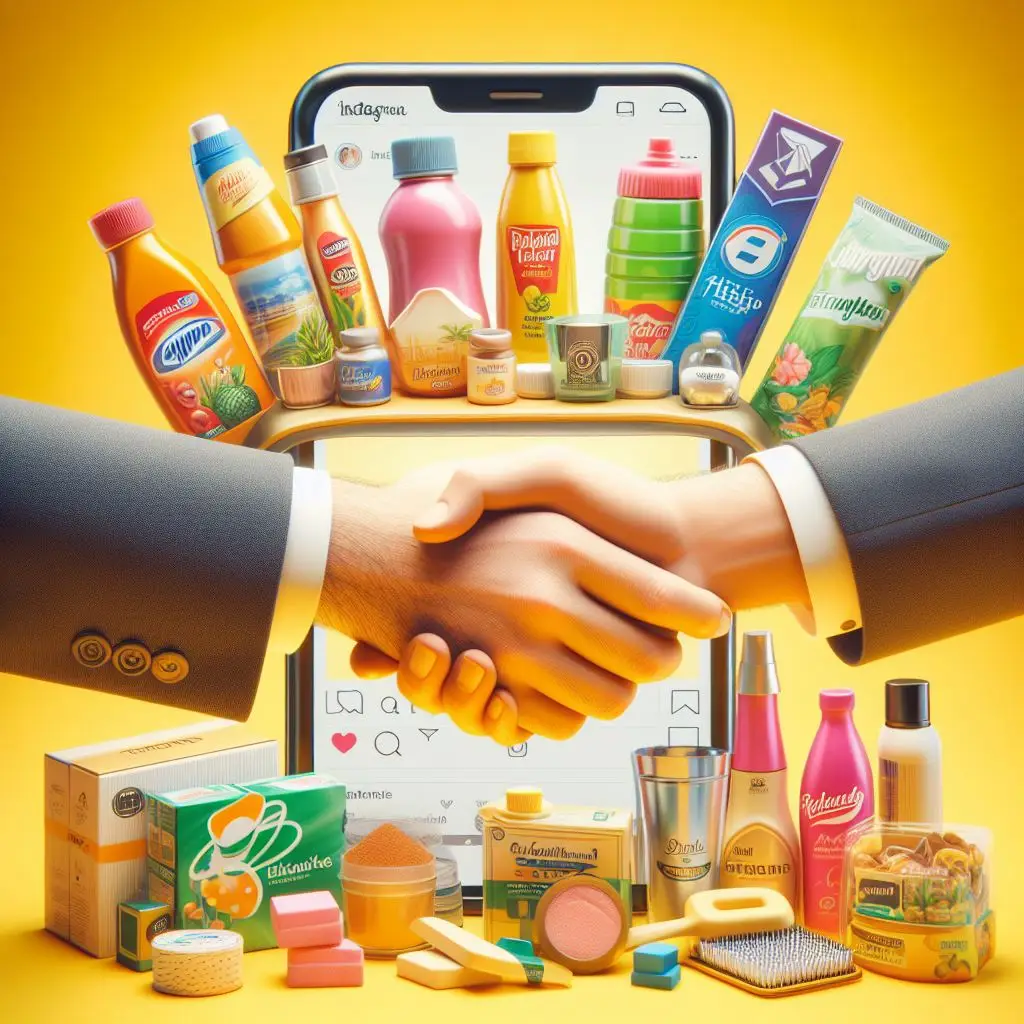
Let’s face the truth – the FMCG industry is competitive, flooded with similar products trying to get consumer’s attention! Now, amidst this how can your FMCG brand stand out? Forget the digital marketing jargon; let’s talk about something more exciting—Influencer collaborations! Discover how they can work wonders for your engagement, both online and offline. Let’s delve into why and how and explore examples of influencer collaborations for FMCG brands.
Table of Contents
- FMCG and Influencer Partnerships
- 5 Benefits of Influencer Collaborations for FMCG Brands
- Examples of FMCG Brands Who Do Influencer Collaborations
- 7 Influencers Marketing Strategies for FMCG
- In Conclusion
- Frequently Asked Questions
FMCG and Influencer Partnerships
Fast-moving consumer goods (FMCG) are in-demand items that go fast and are reasonably priced for most consumers. These are the goods that, quickly leave the supermarket shelves every day. For FMCG, there are four primary requirements. They are as follows:
- Made to be used frequently
- Quickly consumed
- Low cost
- High demand.
Now a question would arise in mind, these products are daily use products and people would buy them anyway so why should FMCG companies work with influencers? Indeed, consumers’ demand for many FMCG products is inelastic (i.e., they do not change their desire for these products significantly in response to price changes) but, brands now more frequently collaborate with influencers for two primary reasons:
- Encourage their followers to buy fast-moving consumer goods (FMCG) online instead of in stores.
- To draw in new target customers, such as Generation Z.
In 2021, nearly 46% of FMCG companies spent their 31-50% of their total marketing budget on influencer
5 Benefits of Influencer Collaborations for FMCG Brands

Gives your brand an emotional value
Brands tend to easily forget that their customers do not always make buying decisions rationally; especially for FMCG goods. Instead, they are more likely to make impulse decisions and people’s emotions are greatly influenced by social media and influencers. After all, Influencer marketing’s main goal is, to convince people to feel like trying out a new product. An influencer should start to evoke strong feelings from their followers to buy your products once they have gained trust for your brand. Ideally, the influencer will spark interest in your product, which will lead to a rise in sales as a result of habit and brand awareness.
In fact, over time, the customer might even come to identify your brand with their favourite creator and your product might remind them fondly of that creator’s creations.
Attracting specific niches
Even though the target market for many FMCG products is broad, influencer marketing allows them to target particular niches. To target that specific market, all they have to do is identify a well-known influencer. For example, if you are an FMCG business trying to attract Gen Z, then you could work with an influencer who posts cool stuff that Gen Z can share with their friends, groups and even their parents.
Building trust for your brand online
Fast-moving consumer items were previously purchased by customers from a nearby grocery shop, convenience store or other local business. But customer behaviour has shifted, with many turning online for their buying needs. Since businesses can now sell in areas that were previously outside of their domain, several brands have seen a significant boost in reach. However, buyers are hesitant to put their money in danger while shopping online, especially if they are unfamiliar with the brand.
Influencers who support the reliability of the brands they collaborate with help eliminate this sense of doubt.
And here’s a little secret – working with a top-tier influencer marketing agency is like having your backstage pass. They know the ins and outs of the influencer world.
Promotes online sales
Over the past years, a consistent trend has been toward higher internet sales. With the emergence of Covid, however, people’s reluctance to shop in person led to a sharp increase in online sales.
FMCG brands have noticed this trend and realised they need to adjust to the new shopping paradigm to maintain market share. Influencers have also aided customers in adopting this adjustment.
Influencers can make the content of product promotion explaining the benefits of products to consumers
Adds value to your brand
Influencers can enhance the public’s knowledge about a brand’s rapidly moving consumer goods. You could believe, as a consumer, that you are an expert on the kind of product you use daily. Influencers can still provide informative material that disputes common misconceptions and offers better ways to use the product.
Influencer marketing also allows firms to add a unique selling feature to otherwise similar goods. Influencer marketing is another tool they might use to change consumers’ opinions on everyday products.
Examples of FMCG Brands Who Do Influencer Collaborations
Sugar cosmetics – Influencer collaborations
Influencer collaborations are a common strategy used by Sugar Cosmetics to introduce and promote new products. For example, the brand collaborated with Indian influencers and beauty bloggers to market its new line of liquid lipsticks. In addition, the company revealed that Taapsee Pannu, a Bollywood star, would be collaborating with them on their newest campaign, #BoldAndFree.
Sugar Cosmetics’ numerous macro- and
Lenskart
Lenskart is well-represented on social media. Apart from conventional advertising mediums like television and print, Lenskart has also made investments in influencer marketing. The business has collaborated with several Indian influencers, including Mouni Roy, Mrinal Thakur, Kiara Advani, Katrina Kaif, and Karan Johar.
In one campaign, Katrina Kaif received a pair of sunglasses from Lenskart, and she uploaded a picture of herself sporting them to her Instagram account. The article created a lot of discussion and curiosity about Lenskart’s offerings, which led to a notable spike in website traffic for the business.
mCaffeine
Influencer marketing for mCaffeine aims to raise brand awareness and recall value in addition to increasing revenue. The business has collaborated with several prominent Indian influencers, including Alia Bhatt and Ileana D’cruz. To promote its products, McAffeine collaborates with both macro- and micro-influencers. This has made it easier for them to connect with the various psychologies of their audience: the one where people look up to and the other where they get daily inspiration.
My Glamm
MyGlamm is an online beauty and wellness company that provides a variety of goods and services, ranging from skincare and makeup to nail and hair care. The #100daysofglow challenge, in which 100 influencers shared their regular skincare regimens using MyGlamm products, was one of MyGlamm’s most popular initiatives. This improved their content strategy and raised brand awareness.
7 Influencers Marketing Strategies for FMCG
Based on what we have read, brands that sell quickly-moving consumer items stand to gain from integrating influencer marketing with micro-influencers into their marketing mix. When collaborating with influencers to promote your products, you can employ the appropriate influencer marketing methods and tactics covered in this section.
Decide your goal
Before diving in, know your why. identify your goals. Is it brand awareness, increased sales or driving traffic to your website? Clearly defined objectives guide your influencer selection and campaign measurement.
Choose influencers who match your niche
Don’t just chase follower counts! Seek influencers whose niche aligns perfectly with your FMCG brand.
Try using a platform or an agency
onsider partnering with a digital marketing agency. They offer expertise in influencer selection, campaign management and ROI analysis, saving you time and resources.
Keep an eye on engagement
Likes and comments are great, but true engagement goes deeper. Look for influencers who spark meaningful conversations, answer questions and foster interaction within their community
Don’t put all your eggs in one basket
Collaborate with a mix of influencers to reach different segments of your target audience and avoid oversaturation.
Use tools to check your ROI
Don’t just hope for results, track them! Maximise your ROI with an FMCG digital marketing agency that measures campaign performance and refines strategies for success.
If your target is Gen Z try Instagram and Twitter
Targeting the younger crowd? Focus on platforms like Instagram and Twitter, where Gen Zers actively engage with authentic content.
In Conclusion
Micro-influencers and authentic collaborations can skyrocket your FMCG brand’s engagement, boosting awareness, sales and brand loyalty. It’s all about finding the right fit, creating engaging content and measuring results. Collaborate with our social media marketing company today! We will help you navigate the world of influencers, craft winning campaigns and achieve your digital marketing goals. Let’s get your brand buzzing!
































